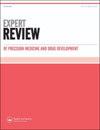基因组心力衰竭生存预测算法的初步独立验证
IF 1.2
Q4 PHARMACOLOGY & PHARMACY
Expert Review of Precision Medicine and Drug Development
Pub Date : 2021-03-04
DOI:10.1080/23808993.2021.1882847
引用次数: 1
摘要
背景:晚期心力衰竭(AdHF)患者生存的生物学决定因素与疾病严重程度的系统生物学特性相关,包括年龄、合并症和虚弱。我们假设,经过训练预测严重机械循环支持(MCS) AdHF患者生存率的算法可以在不同严重程度的AdHF队列中独立验证,这些AdHF队列接受病因特异性干预,包括心脏移植(HTx)、经导管主动脉瓣置换术(TAVR)和持续指导药物治疗(GDMT)。我们基于4个临床参数和12个转录组生物标志物独立验证了我们之前发表的多维算法,并对接受MCS手术的AdHF患者(n = 29)和接受TAVR、HTx、MCS和gdmt干预的AdHF患者(n = 48)进行了训练。结果在独立验证队列中,我们的算法显示出71%的敏感性,90%的特异性,56%的阳性预测值和95%的阴性预测值,可以构建原型生存预测评分。虽然仅使用临床参数预测1年生存的AUC = 0.69,但在临床模型中加入12个差异表达基因提高了AUC = 0.90。我们的初步验证数据表明,所提出的多维算法适用于各种adhf风险组和手术-介入治疗(S/IT),与单独的临床数据相比,提高了生存预测的准确性,值得在更大的队列中进一步研究。本文章由计算机程序翻译,如有差异,请以英文原文为准。
Initial independent validation of a genomic heart failure survival prediction algorithm
ABSTRACT Background Biological determinants of survival in advanced heart failure (AdHF) are linked to systems biological properties of disease severity including age, comorbidities, and frailty. We hypothesize that an algorithm trained to predict the survival in severely ill mechanical circulatory support (MCS) AdHF patients can be independently validated in AdHF-cohorts of varying severity undergoing etiology-specific interventions including heart transplantation (HTx), transcatheter aortic valve replacement (TAVR), and continued guidelines directed medical therapy (GDMT). Research Design & Methods We independently validated our previously published multi-dimensional algorithm, based on 4 clinical parameters and 12 transcriptomic biomarkers, and trained in AdHF patients undergoing MCS-surgery (n = 29), in AdHF patients undergoing TAVR, HTx, MCS, and GDMT-interventions (n = 48). Results In the independent validation cohort, our algorithm demonstrated 71% sensitivity, 90% specificity, 56% positive predictive value, and 95% negative predictive value, allowing for construction of a prototype survival prediction score. While prediction of 1-year survival using clinical parameters alone achieved an AUC = 0.69, addition of 12 differentially expressed genes to the clinical model improved the AUC = 0.90. Conclusions Our initial validation data suggests that the proposed multi-dimensional algorithm is applicable across various AdHF-risk groups and Surgical-Interventional Therapies (S/IT), increasing survival prediction accuracy compared to clinical data alone and warranting further study in larger cohorts.
求助全文
通过发布文献求助,成功后即可免费获取论文全文。
去求助
来源期刊

Expert Review of Precision Medicine and Drug Development
PHARMACOLOGY & PHARMACY-
CiteScore
2.30
自引率
0.00%
发文量
9
期刊介绍:
Expert Review of Precision Medicine and Drug Development publishes primarily review articles covering the development and clinical application of medicine to be used in a personalized therapy setting; in addition, the journal also publishes original research and commentary-style articles. In an era where medicine is recognizing that a one-size-fits-all approach is not always appropriate, it has become necessary to identify patients responsive to treatments and treat patient populations using a tailored approach. Areas covered include: Development and application of drugs targeted to specific genotypes and populations, as well as advanced diagnostic technologies and significant biomarkers that aid in this. Clinical trials and case studies within personalized therapy and drug development. Screening, prediction and prevention of disease, prediction of adverse events, treatment monitoring, effects of metabolomics and microbiomics on treatment. Secondary population research, genome-wide association studies, disease–gene association studies, personal genome technologies. Ethical and cost–benefit issues, the impact to healthcare and business infrastructure, and regulatory issues.
 求助内容:
求助内容: 应助结果提醒方式:
应助结果提醒方式:


